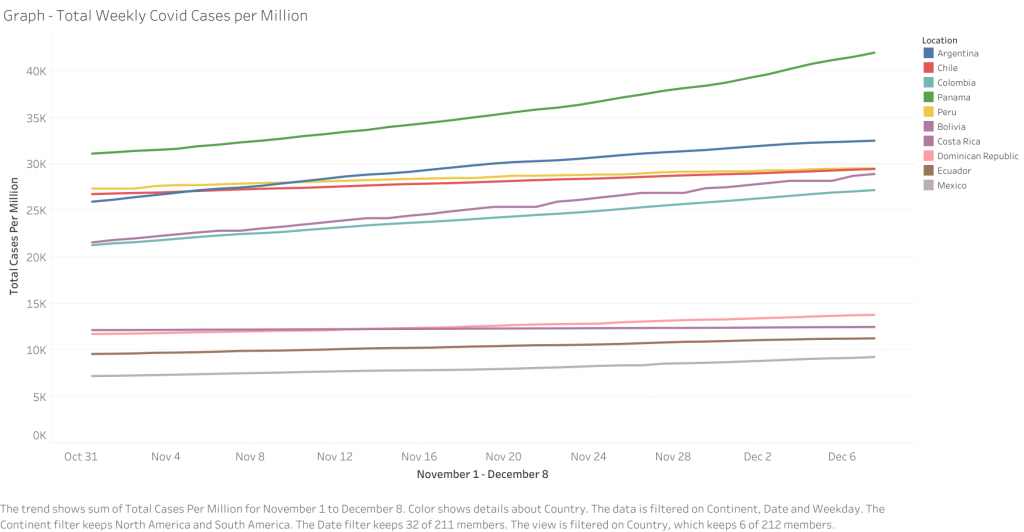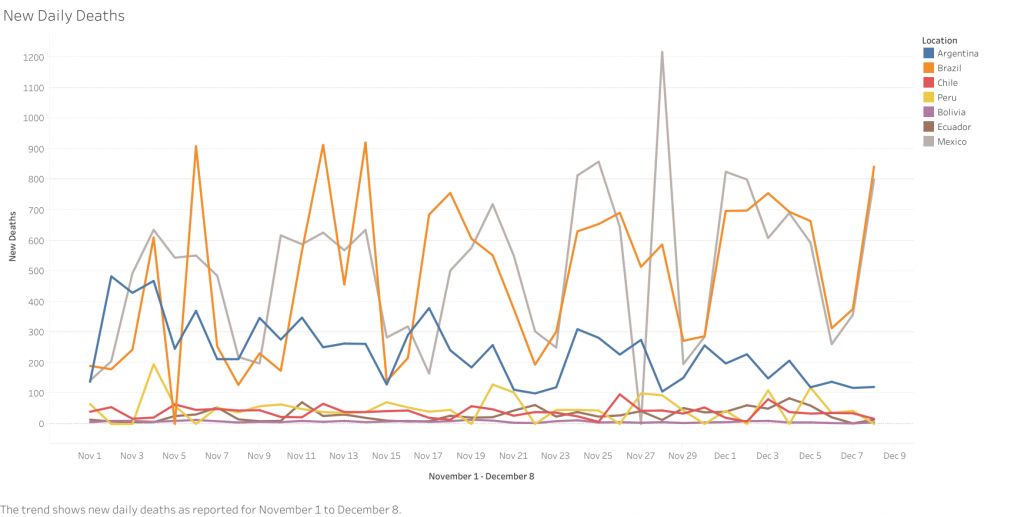What you should know
- 7.3 million: USAID reports this many people in Guatemala, Honduras, and Nicaragua were affected by hurricanes Eta and Iota; 205 people in the region lost their lives due to the storms; and more than 400,000 have entered emergency shelters in Guatemala and Honduras alone.
- 20 percent: The United Nations reports that the number of people experiencing hunger in Latin America has grown steadily over the past five years. The COVID-19 pandemic could further accelerate this regional crisis, threatening a return to malnutrition levels of the 1990s.
- NEW REPORT: Moving Beyond COVID-19: Vaccines and Other Policy Considerations in Latin America.Our Center’s latest publication proposes eight cross-cutting recommendations to help better manage the imminent vaccine-related challenges in Latin America and strengthen regional health systems in the long run. Read the report in English, Spanish, or Portuguese here.
- 842: On December 8, Brazil reported this many deaths, its highest daily toll since November 14. Here are this week’s figures.
Quarantine + reopening plans
Countries are preparing for the holiday season and urging citizens to stay home.
- Panamanian authorities announced the daily curfew will begin at 9 p.m. (instead of 11 p.m.) amid rising COVID-19 cases. The curfew remains in place until 5 a.m.
- In Colombia, Barranquilla, Santa Marta, and Cartagena have further restricted the operating hours of businesses to control the spread of COVID-19 during the holidays.
- Santiago, Chile, returned to phase two of the national reopening plan, closing theaters, bars, movie theaters, and gyms, and reinstating a mandatory quarantine during the weekends.
- Paraguay restricted alcohol sales and the length of social and corporate events to four hours.
- Mexican Secretary of Education Esteban Moctezuma announced in-person classes will resume in states classified as low risk, per the national four-color traffic light system. Currently, three states are classified as low risk, twenty-four states as medium risk, three as high risk, and two as maximum risk
International travel restrictions
- Peruvian Minister of Transport Eduardo González Chávez announced international flights between Ecuador and Europe will resume on December 15.
- A Colombian judge ruled the country must require international travelers to present a negative PCR test and quarantine for fourteen days if their test is taken more than forty-eight hours in advance. The decision has been criticized by President Iván Duque and Health Minister Fernando Ruiz Gómez.
Economies in focus
Economic Impact
- Barclays raised projections for GDP growth in Mexico in 2021 from 3.5 percent to 4.5 percent citing the strong COVID-19 vaccination plan.
- Fitch Ratings increased its projections for regional growth to 4 percent in 2021, although it cautioned half of the region’s sovereign debt profiles have a negative outlook.
- Moody’s lowered its rating outlook for Colombia to negative from stable, citing the impact of COVID-19.
Economic Relief
- Argentina approved a wealth tax on citizens with assets over $2.5 million to raise funds for the government’s COVID-19 response.
- The IDB extended a $120 million loan to Barbados to strengthen health and economic response to the pandemic.
- The Colombian government received $5.4 billion from the IMF as part of its Flexible Credit Line arrangement to help meet balance of payment needs and support the COVID-19 response.
- Costa Rica will resume negotiations with the IMF in January to obtain a credit line to offset the impact of the COVID-19 pandemic. In October, Costa Ricans protested tax measures implemented by President Carlos Alvarado’s administration as part of IMF negotiations.
Resilience, recovery + renewal
Trust matters today more than ever before. In the era of fake news, online animus and political polarization, trust is the lens through which people make decisions about what they believe in and value.
Baker McKenzie’s series of board papers, “Trust Continuum: Why Trust Will Determine Sustainable Commercial Success” explores how organizations can meet new expectations in the era of stakeholder capitalism — not only of their shareholders and investors but all stakeholders — by building long-term trust based on purposeful, transparent and consistent actions and interactions.
In the latest article, partners Beatriz Araujo and Joanna Hewitt consider how the current public health emergency and its macro-economic impact have thrown into sharp relief the obligation on boards to take extreme care when making decisions around dividends. They also argue that boards considering dividends should:
- plan early;
- involve the full range of functions (Accounting, Tax and Legal, as well as Operations, HR, Treasury, the Communications team and others, as appropriate); and
- engage in transparent and strategic decision-making with the ultimate focus on long-term value creation.
Additional resources related to the undeniable link between trust and sustainable commercial success include a podcast episode on Diversity, Inclusion and the Great Pandemic and a report on Sustainability, Governance, and Business Performance.
Health + innovation
- On December 8, the US Food and Drug Administration (FDA) confirmed the Pfizer and BioNTech COVID-19 vaccine meets requirements of emergency use authorization (EUA) in the United States. An independent advisory panel will meet on December 10 to evaluate the vaccine’s efficacy and safety before advising the FDA on whether to issue the EUA or not.
- In the United Kingdom, COVID-19 vaccine inoculations began on December 8 at selected hospitals that have received the first doses of the Pfizer and BioNTech vaccine. Experts warn the two biggest risks of the vaccine are the cold chain and theft by criminal groups.
- On December 9, UK’s National Health Service reported two recipients of the vaccine had adverse reactions, and warned people with a history of significant allergic reactions to food or medicine to avoid the Pfizer vaccine.
- China’s Sinovac secured $515 million in funding to double its CoronaVac production capacity from 300 million to 600 million doses annually. Sinovac has signed supply deals for the vaccine with Brazil, Indonesia, Turkey, and Chile.
- PAHO Representative to Barbados and the Eastern Caribbean countries Dr. Yitades Gebre said the health agency will advocate for flat pricing and equitable access to the COVID-19 vaccine.
- On December 7, Brazil’s Vice President Hamilton Mourão said Brazil will vaccinate 150 million people by the end of 2021. The government is mostly relying on the AstraZeneca vaccine, but is also in talks to purchase 70 million doses from Pfizer.
In Focus: Venezuela
- In the midst of the pandemic, on December 6, Venezuela held parliamentary elections that were neither free nor fair. Previously denounced as fraudulent by the Venezuelan interim government, the United States, the European Union, the Lima Group and the Organization of American States, less than 30 percent of Venezuelans participated in the elections.
- The new National Assembly will not be recognized by the nearly 60 countries that recognize Juan Guaidó as Venezuela’s legitimate leader. Adrienne Arsht Latin America Center experts foresee the opposition will reorganize into a new political structure supported by the United States and its allies.
- Years of Maduro regime mismanagement have left Venezuelan healthcare underprepared and under-resourced to handle the pandemic. Nurses and doctors earn around $3 and $5 per month, respectively. Although official figures report over 105,000 cases and 928 deaths, experts argue numbers are severely underreported.
- Vaccine inoculation in Venezuela is expected to begin in April 2021. Maduro confirmed his government will acquire 10 million doses of Russia’s Sputnik V vaccine. Phase three trials of Sputnik V are currently underway in Venezuela, among other countries. In October, Maduro also reported plans to vaccinate Venezuelans with Chinese vaccines.
By the numbers
- Cases by country: Brazil (6,675,915) #3 worldwide, Argentina (1,469,919) #9 worldwide, Colombia (1,384,610) #9 worldwide, Mexico (1,193,255) #12 worldwide, Peru (976,621) #15 worldwide, Chile (563,534) #23 worldwide, Ecuador (198,752) #41 worldwide, Panama (181,166) #42 worldwide, Dominican Republic (149,630) #50 worldwide, Costa Rica (147,430) #51 worldwide, Source: worldometers.info
- Deaths per capita (deaths per million people): Peru (1,097) #3 worldwide, Argentina (882) #12 worldwide, Mexico (856) #15 worldwide, Brazil (836) #17 worldwide, Chile (817) #18 worldwide, Ecuador (777) #20 worldwide, Bolivia (767) #21 worldwide, Panama (746) #22 worldwide, Colombia (746) #23 worldwide, Belize (447) #39 worldwide, Source: worldometers.info
- Prevalence rate (total cases per million people): Aruba (46,595) #12 worldwide, Panama (41,702) #16 worldwide, Argentina (32,393) #28 worldwide, Brazil (31,310) #31 worldwide, Peru (29,441) #36 worldwide, Chile (29,369) #37 worldwide, Costa Rica (28,826) #39 worldwide, Colombia (27,086) #42 worldwide, Saint Martin (20,564) #54 worldwide, Belize (19,995) #56 worldwide, Source: worldometers.info
Quick take


Sponsored By

